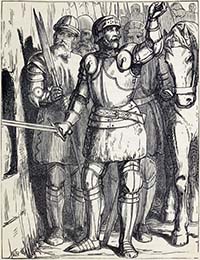I subscribe to BritBox and I have worked my way through most of the mystery series I enjoyed (Jonathan Creek, No Offense, MacDonald and Dodds, Cadfael, New Tricks, mostly) so I have been giving lit-er-a-choor a try.
Britbox offers the entire canon of Shakespeare as interpreted by the BBC. I am working my way through the plays I have never seen or read (an embarassingly large number) and watching each one until I get bored or too puzzled by the language. (They make the subtitles too damn small.)
 |
| The Trout |
For example, I tried watching Henry VI, Part 1, and gave it up quickly. Not even a guest appearance by Joan of Arc could keep me tuned in.
But I made it through Henry VI, Part 2, no trouble. I noticed that Wikipedia says Part 2 is usually considered the best of the trilogy. We will see how I feel about Part 3.
Some random thoughts. There are few Shakespearean characters I have wanted to give a good punch in the kisser as much as Henry VI. What a boring, pious, pompous little trout. No wonder his wife wants nothing to do with him.
But speaking of Queen Margaret, I had a really writerly moment during one of her speeches. She watches hubby walking away with another fella she dislikes, Warwick, and says: "There's two of you; the devil make a third!" First I thought: Billy the Bard sure knew his way around a curse, didn't he? Then I thought: What a great title! The Devil Make a Third.
 |
| privateproertynotrespassblogspot.com |
A quick search taught me that one author had already figured it out. Douglas Fields Bailey wrote a novel by that name in 1948. As I understand it, the book is about a rural man who makes it to wealth by any means necessary - a not uncommon theme of the time. The book was reprinted for the Library of Alabama Classics series in 1989. There is an entire website dedicated to the book, run, as near as I can tell, by Robert Register.
There are also many novels called Devil Makes Three and some of the authors might have been thinking of Queen Margaret (as I'm sure we all do from time to time).
The most interesting part of the play for me was the Jack Cade section, based on the largest rebellion in England in the 15th century. Shakespeare sees it as a highly anti-intellectual event, with simple literacy being a capital offense. It is here that Dick the Butcher gives us what I think is the play's most famous, much quoted, line: "The first thing we do, let’s kill all the lawyers."
 |
| Jack Cade, against Woke Education |
The play also made me wonder whether the Globe Theatre had a propmaster whose specialty was severed heads. There are four, count 'em, four, hacked-off noggins in HVI2. There are others in Macbeth and Titus Andronicus, among other of Billy's little skits.. I found an interesting article by Michael J. Hirrel discussing the chop-chops in Elizabethan plays and he pointed out something that never occurred to me. Shakespeare's audience would have been quite used to seeing severed heads in real life. So it is reasonable to assume that someone went to a lot of trouble to make the props realistic and each one unique.Personally, I'd rather be a writer. So far, no severed heads adorn my work.

I've never run to severed heads, either. I've belonged for years to a Shakespeare group that meets once a month and reads Shakespeare aloud. We've worked our way through the entire canon, more than once. Some are pretty undigestible, like Cymbeline, and others are nauseating like Titus Andronicus. But when he was on... he could write!
ReplyDeleteI made it through Part 3 and Richard III. Stalling out on Titus Andronicus...
DeleteMost people stall out on Titus Andronicus. This month the group is reading "The Merry Wives of Windsor" - anything with Falstaff!
DeleteI didn't know that's where the quote came from, Rob! Thanks for tuning me in. Melodie
ReplyDelete